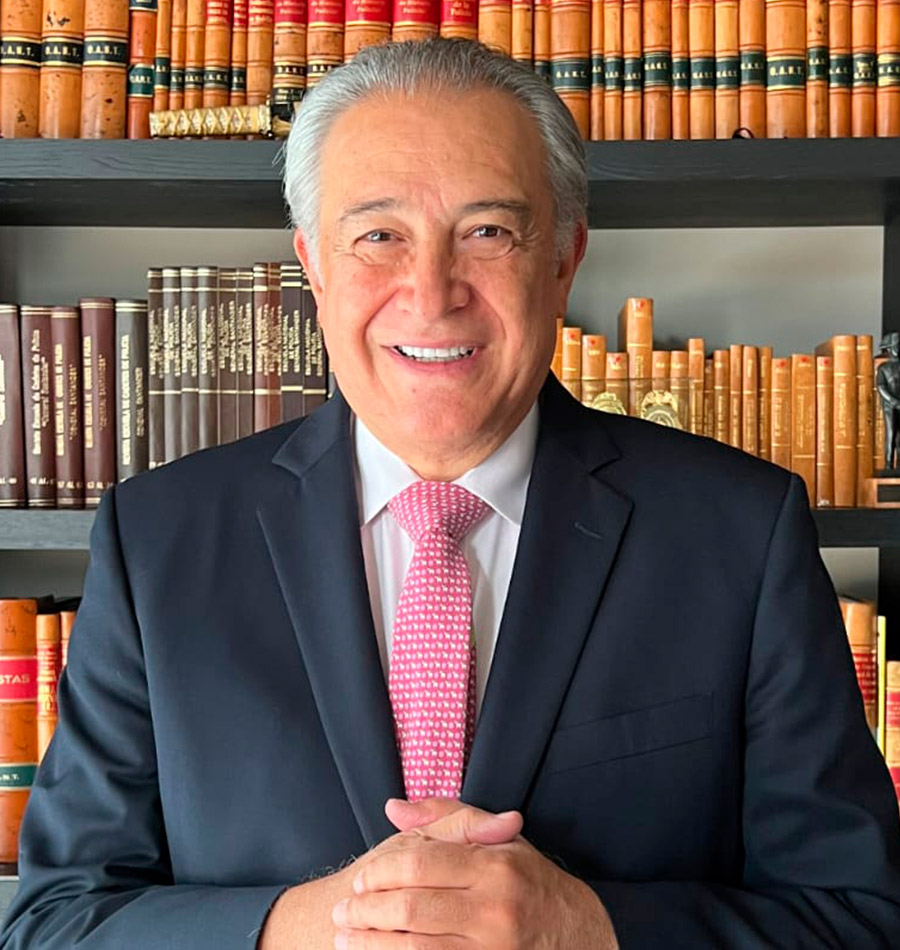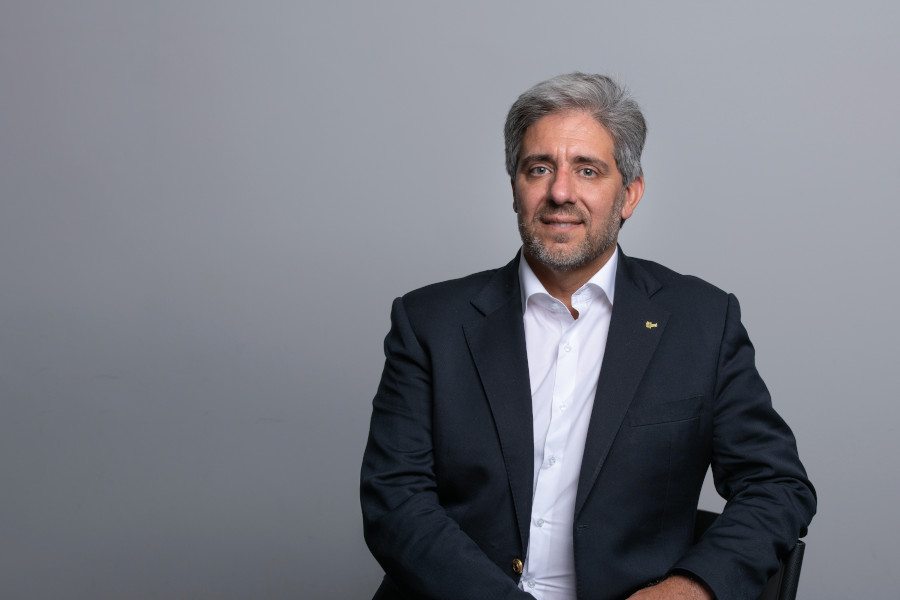Interview
General Óscar Naranjo Trujillo
Former Director General of the National Police and former Vice-President of Colombia
In this unique interview, we have the privilege of conversing with the esteemed General Óscar Naranjo Trujillo, an emblematic figure in Colombia’s history. With a remarkable career in the National Police, General Naranjo has led a tireless fight against organised crime that contributed to the downfall of nearly 700 drug trafficking leaders, including iconic figures such as Pablo Escobar.
His impact transcends the security sphere, as he played a crucial role as a plenipotentiary negotiator in the historic peace talks with the Revolutionary Armed Forces of Colombia – People’s Army (FARC-EP) and served as the country’s Vice President. General Naranjo shares with us his insights and perspectives on the fight against organised crime in Latin America.
JT: The General has previously said that in the area of international crime “there is a real turning point in human history”.
Could you share your perspective on the current state of organised crime and how it has evolved during your career?
Gen. ON: Organised crime has a nefarious and stark influence built around a criminal economy based on drugs, particularly cocaine. Approximately three to four decades ago, the initial manifestation of organised crime was characterised by a rather diffuse structure, often comprising families or criminals collaborating to facilitate the transportation of drugs from South America, primarily Colombia.
Then, a second phase emerged, signifying a qualitative shift in the nature of organised crime. This phase saw the emergence of what the Americans began to call “cartels”, which were organisations with a centralised command and control system, a vertical structure and a focus on securing every aspect of the drug production and distribution chain, spanning from coca leaf cultivation to distribution in the United States. In Colombia, this era gave rise to two major criminal organisations that had political ambitions of legitimising their criminal activities. Pablo Escobar, for example, dreamed of a drug trafficking state that would generate wealth and prosperity for Colombians.
The Medellín cartel focused on buying land and accumulating assets to launder money, while the Cali cartel invested in industry. Medellín was notorious for employing brute force, often with the infamous “plata o plomo” (silver or lead), meaning be corrupted or die In contrast, the Cali cartel operated more discreetly, resembling the Italian mafia, exercising violence in a more subtle manner, having its own political spokesmen, and laundering its assets in the legal economy.
Then, another form emerged, often called “baby cartels”, which operate as a criminal holding company. These comprised numerous groups of drug traffickers with clean criminal records, possessing a global outlook on their illicit business endeavours, and a strong desire to remain unidentified. Today, we are witnessing highly fragmented criminal structures that are capitalising on the era of globalisation, expanding their international relationships, and distributing their operations through collaborative commands.
We are talking about a criminal project that combines profit derived from criminal economies, with the capacity to coerce citizens and control territories, ultimately aspiring to establish territorial governance. And this moment of inflection also coincides with a very high proliferation of criminal economies that are not only related to drug trafficking, but also to mining and human trafficking.
It is very shocking to see what is happening today. In the past, when we talked about organised crime in Latin America and the Caribbean, we could identify three main regions: Mexico, Central America, and Colombia and Peru in South America. Today, when one looks at the map of the deployment of organised crime, it is amazing to see how it has spread throughout the territory.
Previously unimaginable scenarios have unfolded, such as organized crime establishing a presence in Chile, through the franchise of the so-called Aragua Train, thereby creating a criminal industry centred on extortion, kidnapping, and micro-trafficking. Similarly, the idea of Argentina, once considered a sanctuary for refuge and money laundering, transforming into a hub of criminal activities, complete with reprisals against those who fail to pay extortion, was unforeseeable.
I have been working on an inventory of the criminal organisations that exist in each country for at least eight months. And this task seems to be never-ending. There are literally hundreds. In the case of Colombia alone, there are at least 400 organisations. We are seeing the greatest fragmentation and proliferation of organised crime in the region in many years.
We are seeing the greatest fragmentation and proliferation of organised crime in the region in many years.
What are the specific challenges or opportunities for countering organised crime in Latin America?
Gen. ON: Organised crime has swiftly evolved, adapting to new realities by harnessing technology, engaging in corruption, and attempting to infiltrate the state. Simultaneously, these criminal entities excel at communication to gain legitimacy within communities. States must undergo transformations of their own to effectively counter organised crime.
Throughout the history of states’ efforts against crime, we can discern three distinct stages. The initial stage primarily focused on controlling the flow of illicit goods. While significant drug seizures occurred, these organisations remained largely unscathed. In the second stage, I would say largely spearheaded by Colombia, the objective shifted towards apprehending and subjecting the leaders of organised crime to the rule of law. Figures such as Pablo Escobar were killed, the Rodríguez Orejuela brothers were captured, and around two thousand major drug lords were captured for extradition.
But the business was not affected. Someone always appeared to succeed them.
The third stage arose with a recognition of the need to disrupt not only the leaders but the entire criminal structure, resulting in a huge increase in imprisonment and the rise of the prison population. Yet, once again, the overall landscape remained largely unchanged.
Recent efforts have focused on dismantling the financial infrastructure of organised crime. Although we are still in a somewhat precocious stage in this approach, I believe it holds promise. The Latin American region, particularly in the wake of the pandemic, has witnessed a surge in criminal economies due to the destruction of wealth and job opportunities.
The hope for Latin America may lie in the ability of the formal economy to compete with the illegal economies. As long as the illegal economy continues to have the upper hand in meeting the needs of vulnerable people, this issue will persist.
As long as the illegal economy continues to take advantage of the needs of vulnerable people, we will be confronted with the problem [of organised crime].
JT: Organised crime groups often operate from within prisons, which has an impact on society at large. In many Latin American countries, this reality is aggravated by increased control of the interior of the facilities by criminal gangs.
What are your views on the challenges of addressing the problem of organised crime in Latin American prison systems?
Gen. ON: Confronted with the threat of organised crime and other phenomena such as corruption, there is a consensus in Latin America on the need to strengthen the justice system in order to combat impunity. However, this well-intentioned goal is often somewhat overshadowed by punitive populism. There still exists a deeply ingrained perception that justice is an action of punishment rather than rehabilitation. The notion that increasing penalties and creating new crimes is the solution is proving to be ineffective.
Frankly, in Latin America, the penitentiary system and penitentiary policy have failed, with a recidivism rate of around 67% and prisons that function as crime control commands. For some experts, the region’s prisons are true “universities of crime”. Individuals who initially enter for minor offences can emerge with an advanced degree in criminal behaviour, after being locked away with dangerous criminals.
Addressing this issue requires a fundamental reevaluation of the criminal justice system’s purpose in the region. The focus should shift from punishment and retribution to rehabilitation and social reintegration. It is essential to reexamine penalties for minor offences and avoid overcrowding prisons with non-violent offenders.
A greater involvement from civil society is necessary, as the state alone cannot produce successful reintegration. The system should open its doors to collaborations with private companies to offer second chances to offenders and facilitate their reintegration into society.

How can prison administrations ensure control of prisons in the face of the power of organised crime structures?
Gen. ON: I believe that an effective penitentiary system must prioritise the confinement of the most dangerous criminals or those capable of commanding and controlling criminal structures within high-security prisons. These facilities should not be overcrowded, strictly housing individuals who, after rigorous assessment and evaluation, genuinely pose a threat of exerting influence beyond the prison walls. A second category of incarcerated individuals should be placed in prisons where the state ensures that their time spent in detention is actively used for vocational training and work, preparing them their release and return to society.
Then, there is a third profile of prison population for whom well-established and widely-adopted measures, such as those seen in Europe, should be implemented. In these cases, for example, a prisoner resides in a custody facility but is permitted to work outside during the day under the supervision of a company.
Although their freedom is restricted, this final phase is intended to prepare them for a second chance at living in society.
Looking ahead, what are the most pressing priorities for tackling organised crime in Latin America and what role should different stakeholders play in addressing the problem?
Gen. ON: The issue of organised crime is too big to be left to the state alone. Collaboration including academia and the scientific community is imperative to gain a deeper understanding of criminal dynamics, including the underlying motivational factors and operative methods of organised crime in different regions.
It is essential to establish a global or regional intelligence system that goes beyond simple operational exchanges of information. There must be a regional intelligence platform where analysts share information in a more comprehensive manner.
In addition, it is very important to address the cracks in the formal economy that allow money laundering, looking for more consistent models at a regional level to prevent this illegal activity. States must enhance their legitimacy next to vulnerable communities under the control of organised crime, offering them alternative opportunities and demonstrating that the state can compete with the criminal economy.
Finally, we must move away from a simplistic narrative on organised crime that goes beyond the cliché of the "tough on crime" policy. This strategy is not the solution and often leads to human rights violations.
Instead, we need a narrative that legitimises the state and empowers citizens, emphasising respect for the law and human rights. We must prevent citizens from becoming trapped between organised crime and authorities who employ excessive force.
Amidst these challenges, it is crucial to avoid adopting a fatalistic or apocalyptic discourse. Latin America has successfully overcome many challenges. From Colombia, we can say that we have triumphed over Pablo Escobar’s attempts to turn us into a narco-state, and the political project for seizing national power through insurgency by the FARC. It is imperative for us to listen to one another more attentively and collaborate across borders to confront these complex issues collectively.
General Óscar Naranjo Trujillo
Former Director General of the National Police and former Vice-President of Colombia
Óscar Naranjo Trujillo is a politician and former General of the National Police of Colombia. He served as Vice President of Colombia from 29 March 2017 until 7 August 2018. Prior to that, he served as Director General of the Police, from 2007 until his retirement in 2012. Throughout his career, he has also worked in the command of multiple Police, Special Operations Command, and Intelligence forces. He is a member of the International Drug Enforcement Association (an affiliate of the US DEA) and the International Association of Chiefs of Police. In 2010, the latter organisation recognised him as the best police officer in the world.


